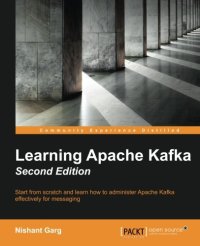
Ebook: Learning Apache Kafka, Second Edition
Author: Nishant Garg
- Tags: Data Processing Databases Big Computers Technology Java Beginner s Guides Reference Servlets Languages Tools Programming Software Development Design Testing Engineering Almanacs Yearbooks Atlases Maps Careers Catalogs Directories Consumer Dictionaries Thesauruses Encyclopedias Subject English as a Second Language Etiquette Foreign Study Genealogy Quotations Survival Emergency Preparedness Test Preparation Words Grammar Writing Research Publishing
- Year: 2015
- Publisher: Packt Publishing - ebooks Account
- Edition: 2
- Language: English
- pdf
Start from scratch and learn how to administer Apache Kafka effectively for messaging
About This Book
- Quickly set up Apache Kafka clusters and start writing message producers and consumers
- Write custom producers and consumers with message partition techniques
- Integrate Kafka with Apache Hadoop and Storm for use cases such as processing streaming data
Who This Book Is For
This book is for readers who want to know more about Apache Kafka at a hands-on level; the key audience is those with software development experience but no prior exposure to Apache Kafka or similar technologies. It is also useful for enterprise application developers and big data enthusiasts who have worked with other publisher-subscriber-based systems and want to explore Apache Kafka as a futuristic solution.
In Detail
Kafka is one of those systems that is very simple to describe at a high level but has an incredible depth of technical detail when you dig deeper.
Learning Apache Kafka Second Edition provides you with step-by-step, practical examples that help you take advantage of the real power of Kafka and handle hundreds of megabytes of messages per second from multiple clients. This book teaches you everything you need to know, right from setting up Kafka clusters to understanding basic blocks like producer, broker, and consumer blocks. Once you are all set up, you will then explore additional settings and configuration changes to achieve ever more complex goals. You will also learn how Kafka is designed internally and what configurations make it more effective. Finally, you will learn how Kafka works with other tools such as Hadoop, Storm, and so on.